|
"What a luxury!" a friend said to me when she heard I was going on a silent retreat.
"I've discovered a silent retreat is not a luxury, it's a necessity!" I replied. She had no idea how serious I was about my need for silence. At the beginning of July, my body was letting me know I needed a pause--irritability & a short fuse, quick to tears, constant tiredness, feelings of overload & overwhelm, etc. My spouse was letting me know he needed a pause given how his own emotional and physical weariness had intensified by the loss of his father earlier this year. My kids were letting me know they needed a pause to recover from the pressure of school & sports schedules as well as a very active June. Looking at our July schedule, we decided the planned family vacation to Seattle was not a wise idea. It was full of activity rather than rest. And even though we had been looking forward to it for a long time, we would not push through, instead we would pause. While it was to look differently for each of us, all of us needed silence and solitude. Russ went to Missouri to stay at his dad's house by himself then I went to Sacred Heart Monastery in Cullman, Alabama (pictured above) for a private silent retreat. And the kids spent time inside and outside their rooms, painting and playing driveway basketball, allowing for some slow summer days at home. A pause offered us space to grieve and breathe. A pause also helped us see! "When your eyes are tired, the world is tired also," begins poet David Whyte in "Sweet Darkness" from The House of Belonging. When tired, I need to rest my own eyes so I can see the world differently. Of course this is both literal and metaphorical! At Sacred Heart, I needed to literally sleep and have large chunks of time with nothing to do but rest and remember. A sacred pause often looks so ordinary! Here's what mine looked like:
Did it solve all of my problems? No, but it gave me needed insight. It helped me see myself, my work, spouse, kids, and world in a new (or renewed) light. I was reminded that I am not and never will be superwoman. I was also reminded that I have the strength to establish or return to some much-needed boundaries. And my time away affirmed how much I need regular time away! My family, friends, and co-workers would agree! ______________________________________________ What are your indicators that you need a pause? Is there anything you need to pause, postpone, or plan differently? You don't have to go anywhere but sometimes it's good to get away. Even Jesus invited his disciples to "Come away all by yourselves to a quiet place and rest awhile." (Mark 6:31) As his disciples experienced, life can get to be too much sometimes so silence & solitude are a necessity! So whether or not you join me for Centering Prayer or the 4-day silent retreat at Sacred Heart Monastery in October, may you, too, allow silence and solitude to be friends on your journey. (This blog was part of an e-news sent July 2023. Sign up for Kasey's quarterly e-news here.) A week ago, Steve had an experience of God at the 4 day silent retreat at St. Meinrad Archabbey that he will never forget. Here's his story in his own words...
"It wasn't that I ended up or happened to be at the retreat, it was the retreat ended up happening to me! I have a past that I hadn’t been able to deal with, in fact I let it define who I was. As a result I struggled with how God could love me. I read about His unconditional love in the Bible, it was preached from the pulpit, but I could never let it into my soul. During four days of silence and total disconnect from daily life along with Spiritual Directors as God’s conduit, I surfaced deeper sins I had refused to look at and became aware that all these sins were not who I was, but something I did. Remove what I did and I am still the child of God He created. In my silence focusing on listening to God I heard Him speak, “Steve, I love you.” And I melted. I cried. I felt lifted up. My spiritual awakening could not have happened without the silent retreat and spiritual direction. It created the environment where I could actually hear God speak to me. I have been so blessed. A couple of days later I awoke at 3:30 am giddy with life like Ebenezer Scrooge on Christmas morning." ________ The power of Silence and Spiritual Direction! Many thanks to Sally Sharpe for joining me to provide spiritual direction at this silent retreat. Note: Steve started to befriend Silence through Centering Prayer and a silent day retreat. You're welcome to join me online any Friday from 9am-10am CT for a Centering Prayer group. Beginners always welcome! Contact me for the Zoom link. Or maybe both.
Whatever length, from 90 minutes to 4 days, I always offer these words at the beginning of a silent retreat: "Some of you have come here to rest, some to wrestle. You will probably end up doing both and both are holy." Many people think the purpose of a retreat, especially a silent one, is to rest. And that's true...but sometimes what brings rest doesn't feel like it at first. The pace of life can leave little time to slow down or stop for a while. A silent retreat offers one an opportunity to do just that...there's nothing one has to do. There is no food to prepare, no lawn or children to take care of, no work-related tasks that need to be done...ah freedom! Slow walks, naps, sitting by a pond, taking time while eating, these can be a welcome change of pace. But the pace of life can also leave little time to tend to feelings of grief and anger. A silent retreat offers on an opportunity to do just that...there's plenty of space in your schedule to welcome what has not had time (or permission) to surface. For those who have been in survival-mode from one day to the next, whatever the cause, a cleansing cry may bring the kind of rest most needed. A prayer walk or talking to a spiritual director about one's anger rather than continuing to hold it in may bring the freedom most desired. And where better to wrestle than a safe, quiet, and beautiful place of prayer?! One retreatant pointed out how the word "rest" is found within the word "wrestle." Fascinating. We do not need to fear wrestling, for within it we find rest! Is it time for you to come away to a quiet place by yourself to rest and wrestle? I've got an opportunity for you! A couple of rooms have become available for October 28-31, at Saint Meinrad Archabbey in St. Meinrad, IN. Scholarships are available. Register here. "Make Me an Instrument of Your Peace" is this silent retreat's theme. And peace may just begin with some wrestling!  Photo by cyrus gomez on Unsplash Photo by cyrus gomez on Unsplash The comforts of language are true and deep; writes Mary Oliver at the start of “If You Say It Right, It Helps the Heart Bear It” in Evidence. Language is important. Every area of life has its own language whether the world of science or business, music or 12-step groups, the same is true for the world of spiritual direction. One of the first things people notice when coming to spiritual direction is it offers a new kind of language. For those suffering from religious abuse, the language itself can be a balm for the soul. After her first session of spiritual direction, a woman said to me, “The words ‘deep permission’ and ‘invitation’…I’ve just never considered Jesus offering me those, it feels extravagant. But I feel such relief to think that God would be giving me permission and inviting me into something so healing…those words alone have been a revelation today.” No language is perfect, but it helps convey something of essence or experience. Words like hospitality, authenticity, curiosity, allowing, and stirring, offer a different way of entering into a conversation about God and with God. A youth and children’s pastor started using this language of invitation and curiosity during spiritual direction. He has come for a while so has become familiar with thinking about and entering into the spiritual life in some different ways. Hearing him talk warmed my heart, because I knew he was integrating this language of the soul into his work with children and teenagers. As we enter more deeply into these words and find them life-giving, we cannot help but integrate them into our own vocabulary where or when it seems right. However, the irony in all of this, is that spiritual direction isn’t about words at all! We spend a lot of time helping people befriend Silence and the One Who is Beyond All Words. When we and others do speak, the words can be very powerful because they begin with God in Silence. And they can be equally powerful when we do not speak the words, but embody them. I’m reminded of a woman who told me she saw a symbol of another religion in her adult daughter’s home that made her cringe. Usually she would have spoken her mind right away. As she felt her daughter’s eyes on her, she resolved to bring the matter to spiritual direction instead. “Way to go!” I told her, “Way to wait and take it into the Silence with God!” By the end of our session she exclaimed, “Praise God, I’m so glad I didn’t react because it would not have been the right response but one full of fear and judgement. Instead I want to invite her to tell me about it. I want to hear her story.” “And you may learn something really interesting!” I added. Then she asked if there was anything she could read in order to expand her own thinking. After suggesting a book, I said "What a beautiful conversation this is going to be with your daughter! I can't wait to hear about it!" What a wise mother of an adult daughter she is! So words can welcome and invite connection, and words can help us name, describe, and discover even more. But there is no final word—whether it be about God, ourselves, each other, or spiritual direction. We're always growing and expanding...and that’s part of the fun! 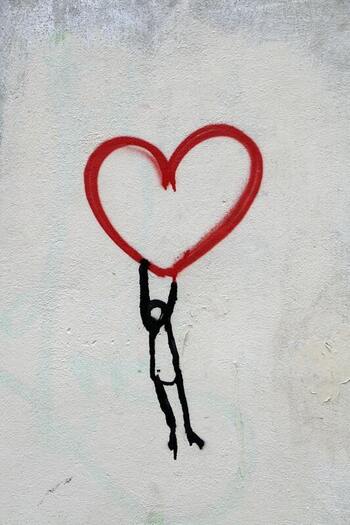 Photo by Nick Fewings on Unsplash Photo by Nick Fewings on Unsplash Living with tension in my chest has been a normal way of life for me for a long while. Feelings of heaviness, anxiety, pressure, and strain are familiar. Usually it is a manageable low-grade variety, but sometimes not. I have dealt with stress in my body for as long as I can remember—from intense stomach issues, headaches, and back pain that began in my early teens through late thirties to chronic hives and tension in my chest that is more prevalent now than the earlier symptoms of the previous decades. What I did not know then that I am beginning to know now is how hard my body has worked in order for me to move through life in productive and even life-giving ways. It has tried to control all the chaos, experienced and perceived, around and within, by holding it in different parts—the head, the stomach, the back, and now the heart. And what does this have to do with Spiritual Direction you might wonder? Well, the spiritual journey is one of giving up control! And that makes a body panic. Authentic spirituality will always lead to surrender and the body is most often the last to let go. Embracing a life of contemplation years ago with its practices of silence, solitude, and stillness has been transformative AND it has led me to this place of being on the brink of a deeper letter go. But first, in teaching me how to be present and not avoid reality, contemplation increased my tension and revealed an inner co-dependency. Weary of the increased tension, I began seeing a somatic therapist (someone who can help me better listen to the wisdom of my body, not just talk about my troubles). She also offers IFS. Internal Family Systems Therapy is a way of working with our internal parts or "family" so that there’s inner harmony rather than polarization and disharmony. I have found it so helpful over the years that I regularly incorporate it into Spiritual Direction with others. So during a session when I turned my attention to my heart, the heart responded with letting me know it was working really hard in “keeping it all together” on behalf of the rest of my body. How?—by consolidating all of the stress and strain into one area, holding it all in the chest…no wonder it felt heavy! As a Reiki Therapist (in addition to being a Spiritual Director), I know that the heart chakra normally filters what is being experienced but my heart was holding it all. Why? It did not want the other parts to feel the pain so it was “taking one for the team.” And the other parts were just fine with this co-dependent relationship. Even if a part was still hurting, it was willingly doing so. This is too common among mothers. Not long ago, I sat across from a mother and wife who has been doing the same thing for her family members. From an outsider’s viewpoint, it can be said that her fun-loving, spirit-lifting self, is the heart of the family. Being sensitive to her family members’ challenges and difficulties, she does her best through a variety of measures to help them not feel pain (or at least not as much), lest in her words, they “be destroyed.” Such a role can drain the light from one’s eyes, while also making it hard to see the co-dependency. Sometimes the only ones who can see clearly are the ones looking from the outside, noticing the absence of the eyes' light. They see the chaos and exhaustion and yet they have the least agency. For no matter how long or often another may see it, true "seeing" must come from within. In the session with my therapist, during a moment of silence, I remembered the painful interaction with my friend a few days before, and my heart said, “What you see in her is me.” Wow! I was surprised and then grateful for this insight. After expressing appreciation for the heroic ways the heart has expressed love for me, the therapist gently reminded this part that it’s easier to pick up a large weight with two hands rather than just one. She went on to say that in allowing other parts to feel the pain and chaos, the burden could be shared. My heart was skeptical but open. It saw and even named the co-dependency itself which meant it was ready for a change. But it still feared that in letting go, I would be destroyed—once again I would experience the searing nerve pain that led to emergency back surgery, the painful IBS that made for uncomfortable moments of dashing toward a restroom, the cancelled plans due to the need to be in a dark room for headache relief, or worse. It wanted to keep me from more of those experiences (and had been doing a pretty good job of doing so!). Yet I had sought help for the tension knowing that true freedom for one does not exist until there is freedom for all, whether in the outer world or inner world. So it began to relax and open in this safe space. And I began to feel the tension spread to my stomach, neck, shoulders, and head…oh no. Gently, I reminded my inner self that I was older now and had insights I did not have earlier in life. We were going to share the burden. And pain did not need to be the enemy. Guess what happened? Instead of being destroyed by the pain, the pain offered wisdom. In being dependent upon the wisdom of the heart, the other parts were sheltered. While this was okay for the short-term, it was unhealthy as a long-term strategy. Yes, different parts of me were not experiencing as much pain, but they were also not aware of the depth of their own strength and agency. “Kasey, when you feel your neck and shoulders get tense, it’s time to take a step back. You’re carrying too much on your shoulders,” the pain in those areas told me. Sometimes we need to step into what we fear may destroy us (or those we love, which is what we fear would destroy us). A spiritual director or therapist is often a wise (and usually a necessary) companion. Sometimes when we take that step, the tension increases. Looking back, the increased tension, even hitting "rock bottom”, is most often what leads to being given new eyes to see. Those new eyes to see help us navigate a new way to be. Next week: “How teaching on contemplative prayer actually encouraged inner co-dependency” 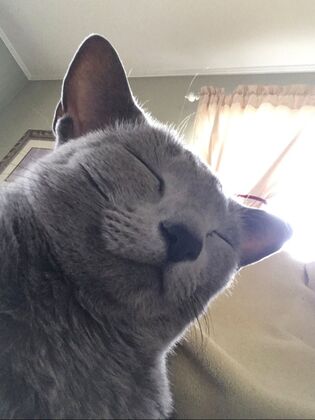 My Russian Blue cat, Birdie, on my lap during Centering Prayer My Russian Blue cat, Birdie, on my lap during Centering Prayer Cats should be the mascot of contemplation. They have resting awareness down. Some people think contemplation is laziness, but this is far from the truth. “Doing nothing so God can do everything” is hard work! It takes an active, yet relaxed, vigilance to stay present rather than follow the mind into the past or future where regret and worry reign. But like a good Zen master, the cat can teach us. "Every single creature is full of God and is a book about God. Every creature is a word of God," Meister Eckhart proclaimed in the late 13th century. I find this to be true as I spend time with my cat. Listening and watching with the ears and eyes of my soul, I discover she has a lot to teach me. Here's some advice she offers... 5 feline tips for contemplation (also known as "contemplative catnaps"):
Cats make contemplation look simple. While simple, it can be challenging. Surrender and serenity are daily exercises that may look different each day! A routine-loving cat still changes nap spots, so how do surrender and serenity look for you today? Watch a cat for a while and allow the Spirit of God, which enlivens both you and the cat, to speak to you through this furry part of Creation.  We all experience the "voice" of the Sacred Presence. Whether or not we pay attention or correctly identify it requires ongoing discernment. One thing is for certain, it's hard when you're hangry (hungry + angry)! On Sunday mornings, my family spends a little time in guided prayer. We often get ideas from Imaginative Prayer for Youth Ministry: A Guide to Transforming Your Students' Spiritual Lives into Journey, Adventure, and Encounter by Jeannie Oestreicher and Larry Warner (I'd use this resource even if I didn't have kids!). The past two weeks, we were "present" in the desert with the exhausted Elijah who needed to rest and eat. Then we were with Elijah again as he experienced God's voice. We, too, received God's invitation to rest and eat in the desert as well as recognized God's voice as we stood beside Elijah on the mountain. After some time in silent reflection, we share what we experienced. I'll share mine. "What are you doing here?" is the question Elijah hears God say to him in I Kings 19:13, twice. As I stood at the mouth of the cave on the mountain in my mind's eye, I realized the power of gentleness through that question. It took me a while, though. The first time, I felt criticized. Tone matters. How we hear God's question to us reveals our current condition, our image of God, and how we interpret and then respond to the question. When I am exhausted, I can hear things in a particular way that perhaps the speaker never intended. I can also miss things the person intended me to hear. My response often reflects my tone deafness. My husband and kids can attest to this! Only after resting and eating, did Elijah have the strength and ability to look, listen, and recognize God's response to his complaint. In Chapter 19 of the book of I Kings in the Hebrew Scriptures (Old Testament of the Bible), we're told that God had Elijah go stand on the mountain and watch for the Lord. A whirlwind, earthquake, and fire came and Elijah did not recognize God in them. It was in what followed the fire...a gentle whisper (the sound of sheer silence some translations say)...that Elijah recognized the voice of God. And God asked Elijah for the second time, "What are you doing here?" The second time, I became curious as to how we were all hearing it in our imaginations. I had my family try something after the time in silence. You can try it, too:
For me, the question changed completely! It went from a judgmental, accusing, you-should-be-doing-more tone, to one of care and concern. The voice in the whisper reminded me of the caring words and actions of the angel of the Lord who had offered much needed rest and food to Elijah forty days earlier. And this reminded me of how the gentle whisper of God never fails to silence my inner critic and relax my body. I no longer feel the urgent need to run and hide (or get compulsively busy). When I listen to the still, small voice, I am ready to hear more-- even if that more is something that in a hangry moment I would not be open to hearing. Like, "What are you doing here?" which could be literal (in this physical place) or metaphorical (in this place in your life). God (& my family) knows that after food and rest, I am ready for an honest conversation! ____________________________
“Are you afraid of leaving your congregation alone in the dark with God?” I asked a pastor who simply could not understand why I would blow out all candles during a Longest Night Service.
He’s not alone. We tend to rush to bring light into darkness in the same way we rush to fill silence with sound. Pastors, especially so. They feel the weight of proclaiming and reminding. Wanting to make sure people know there is hope and “Jesus is the Light,” they constantly talk about hope, repeat Jesus’ name, and keep the lights on, candles burning. Honestly, they’re just as afraid of the dark as most. As a Spiritual Director, I’ve had plenty of pastors on silent retreats and plenty who don’t want to come at all because silence is scary. It seems unproductive and too revealing…which is more frightening?! Given my years as a church staff member and years working with church staff members, both are equally so. So much so, some never dare to come or they walk away from the discomfort never to return to a silent retreat. But discomfort is a doorway to deep transformation. And pastors can be like helicopter parents trying to shield those in their charge from the awkward and uncomfortable feelings that come with silence and darkness. But, have you ever experienced God in silence? In darkness? I have. I’ve also watched and listened to stories of how others have experienced God in silence and darkness. And guess what naturally arises? Hope. And guess where people discover the Light of Christ? Arising in their midst, even from within their very selves! After all, God is everywhere--within and without. The Psalmist proclaims in Psalm 139:12, “Darkness and light are alike to You.” Then he goes on to talk about God forming him in his mother’s womb (another place of darkness where God is present and at work). No lights needed. God is there. And are we not born from our mother’s womb and continue in the womb of the God in whom we live, and move, and have our being? Light and dark are part of every life and God is with us equally in both. Jesus taught that the Kingdom of God is in our midst, even within our very being (Luke 17:21). So we do not have to be afraid of the dark, the inner light never goes out. It just may take some time (& discomfort) to become aware of it. 14th century Persian poet, Hafiz of Shiraz, echoes this reality when saying, “I wish I could show you when you are lonely or in darkness the astonishing light of your own being.” For some reason this scares us, so we look to pastors to talk to us about the Kingdom rather than experience it for ourselves. However, when a pastor (or anyone!) dares to sit in the discomfort of darkness and silence, allowing uncomfortable feelings to emerge and giving themselves permission to rest from all the doing, they begin to radiate trust. This trust allows them to entrust those in their care to the discomfort of silence and darkness because they know God will meet each person in whatever way is needed. Right before an overnight silent retreat a person came up to me after dinner and in all seriousness said, "I'm on the verge of a panic attack the closer we get to going into the silence, I don't know if I can do this." I replied, "I can see why it's scary to you. Know there is a nurse here if needed. And, you're free to leave, but I hope you'll give the silence a try." The person stayed and now they sign up for almost every silent retreat! In befriending silence and darkness, the discovery is made that rather than be afraid of them, they in fact, can be a gift—an opportunity to be still and know that God is everywhere, in our mist, within our very being. A few weeks after talking to the one pastor, another emailed me and asked if her Presbyterian Church in North Carolina, could use my liturgy for their Longest Night Service. Mine had been the first liturgy she had come across that included blowing out candles and letting people simply be with God in the dark. She thought it would be powerful, especially this year, to let her congregation experience God’s presence in the darkness. I could not help but smile. _____________________________________
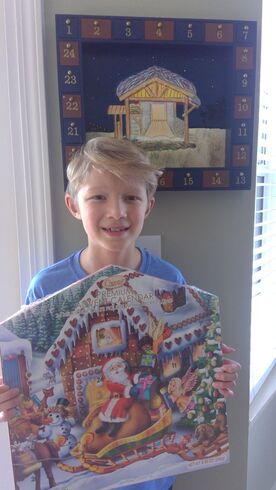 Alex with his magnetic and chocolate Advent calendars (thanks to a friend for the latter!) Alex with his magnetic and chocolate Advent calendars (thanks to a friend for the latter!) We've got magnetic, chocolate, and cheese Advent calendars and we've just started lighting our Advent candles, but something my daughter said stopped me in my Advent tracks. "I hate taking down our fall decorations, I feel like I missed out on enjoying them as much as I could have." To which I replied, "But you're in the house all day, everyday!" (She's doing virtual school the entire year.) To which she replied with a smile, "But I'm worrying a lot, so am I REALLY here?" We both laughed. But I heard her longing and it got me thinking about how we often miss the gifts that are right in front of us like beauty, rest, fun... She is often busy with virtual classes during the day and often does homework right before bed. We're often busy with work and household chores during the day and often are on our phones or falling asleep watching Netflix. Days and evenings can easily come and go in a whir of busyness and distraction. So a few hours later, I said, "I have an idea. Every evening before bed beginning December 1st, let's put down phones and homework, shut off the television, and turn off all the lights except for Christmas lights and candles. Let's sit in silence together for the number of minutes matching the day it is, which means we begin with 1. You can sit or lie down, eyes open or closed, and just take in the surroundings. What do you think?" My daughter and husband were on board immediately, my 10-year-old son nodded slowly but with some skepticism (which makes me particularly excited for him!). So I'll set my Centering Prayer timer for 1 minute tonight and we'll enter into the Silence. A new Advent practice. Doing nothing. But present to everything. __________________________ Whether in the morning, during a lunch break, or before bed, whether the 1st or 14th, you might experiment with Silence as both a way of entering into and a companion during this Christmas season. 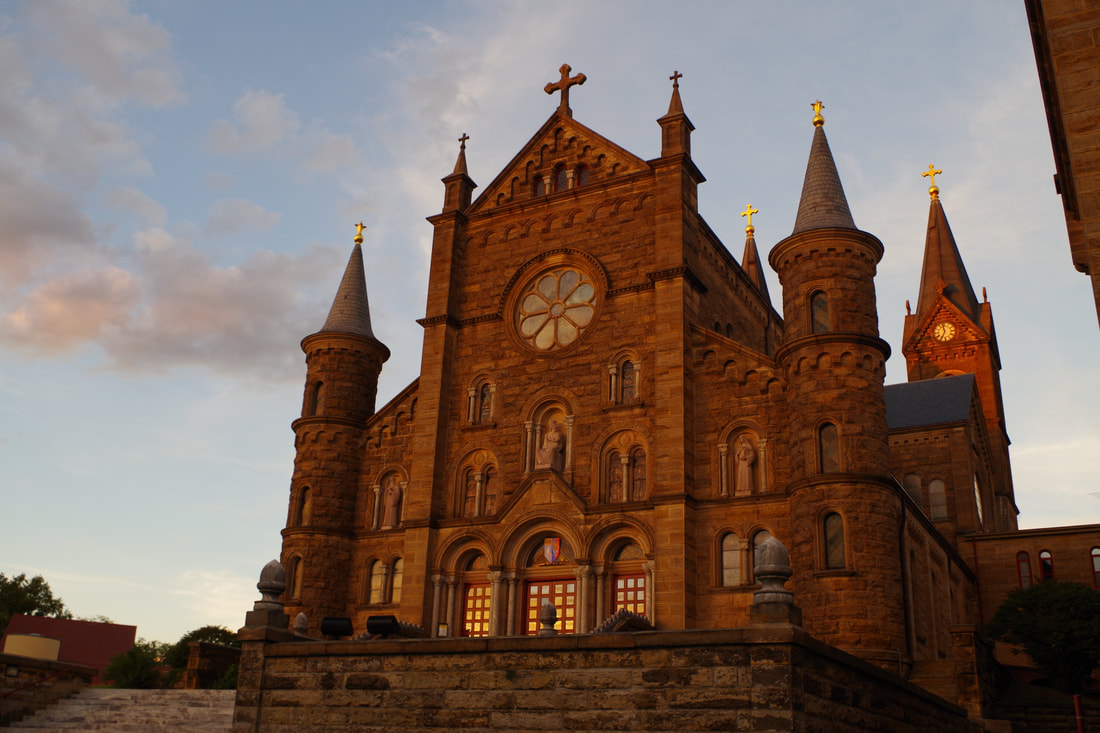 Saint Meinrad Archabbey at sunset Saint Meinrad Archabbey at sunset I was supposed to be traveling today to Saint Meinrad Archabbey for a yearly 4-day Silent Retreat. It's one of my favorite places. I am always excited about facilitating this deep dive into the gift of Silence. Words don't do it justice. BUT the pandemic threw a wrench in my (& everyone's) plans. So, I decided that even though I won't be facilitating a retreat, I can share with you the theme that I picked out for it last year and we can enter into it wherever we find ourselves. We can still pray: "Make me an instrument of your peace." If there's ever been a time to pray this prayer that was written in the spirit of Saint Francis of Assisi, 700 years after his death by Father Esther Bouquerel of France in 1912, it is now!
Lord, make me an instrument of your peace Where there is hatred, let me sow love Where there is injury, pardon Where there is doubt, faith Where there is despair, hope Where there is darkness, light And where there is sadness, joy O Divine Master, grant that I may Not so much seek to be consoled as to console To be understood, as to understand To be loved, as to love For it is in giving that we receive And it is in pardoning that we are pardoned And it's in dying that we are born to Eternal Life Amen. ________________ "Blessed are the peacemakers," said Jesus, "for they will be called children of God." To be a peacemaker does not mean:
To be a peacemaker means we not only pray and enjoy peace, but we actively work for peace. For everyone. Not just ourselves. However, receiving inner peace enables us to extend outer peace...hence, the silent retreats. Silence offers an opportunity to slow down, to quiet the outer voices that we may look within and discover the inner voice of the God of Peace. Will you join me in reflecting, meditating, walking, dancing, stretching, playing, singing, resting, and working with this prayer over the next 4 days? Praying it first for yourself and your internal world: Lord, make me an instrument of your peace toward myself... Then praying it for those outside of yourself. Praying it on behalf of not only your family and nation, but the whole world. Praying to embody the words as you come in contact with the world--from those in your own house to the grocery store and social media. Let's breathe in and out the words of the "Prayer of St. Francis" and in so doing, may we become instruments and children of the God of Peace. |
AuthorKasey is a scarf, ball and club juggling spiritual director just outside of Nashville, TN. Play helps her Type-A, Enneagram 1 personality relax, creating space for poetry and other words to emerge. She also likes playing with theological ideas like perichoresis, and all the ways we're invited into this Triune dance. Archives
January 2024
Categories
All
|
By clicking “Sign up for E-News” I consent to the collection and secure storage of this data as described in the Privacy Policy. The information provided on this form will be used to provide me with updates and marketing. I understand that I may modify or delete my data at any time.
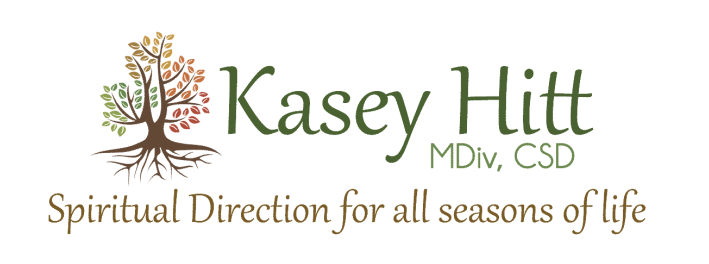
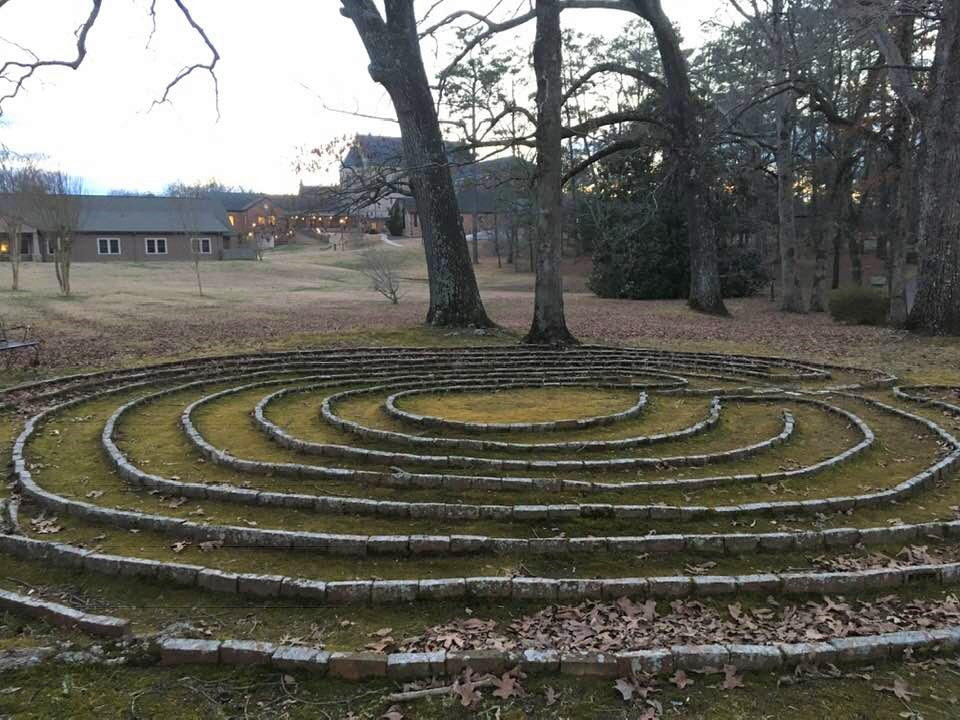
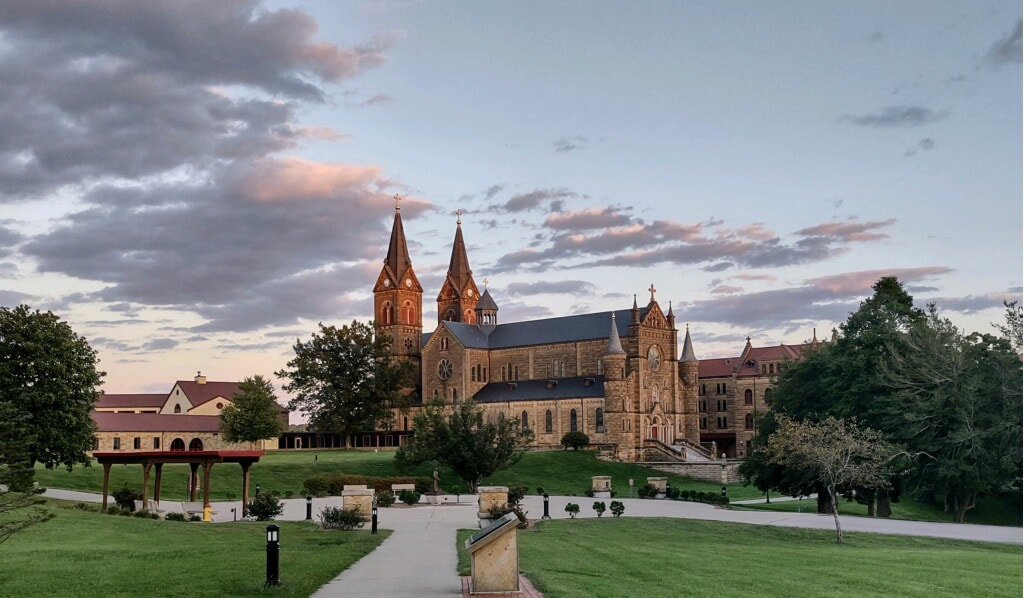
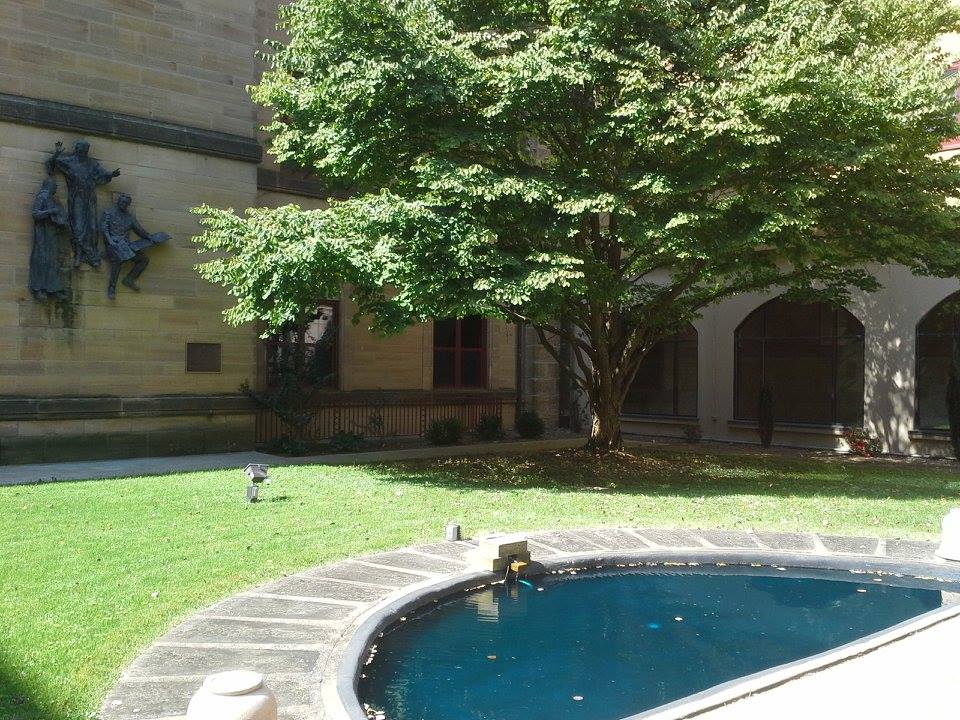
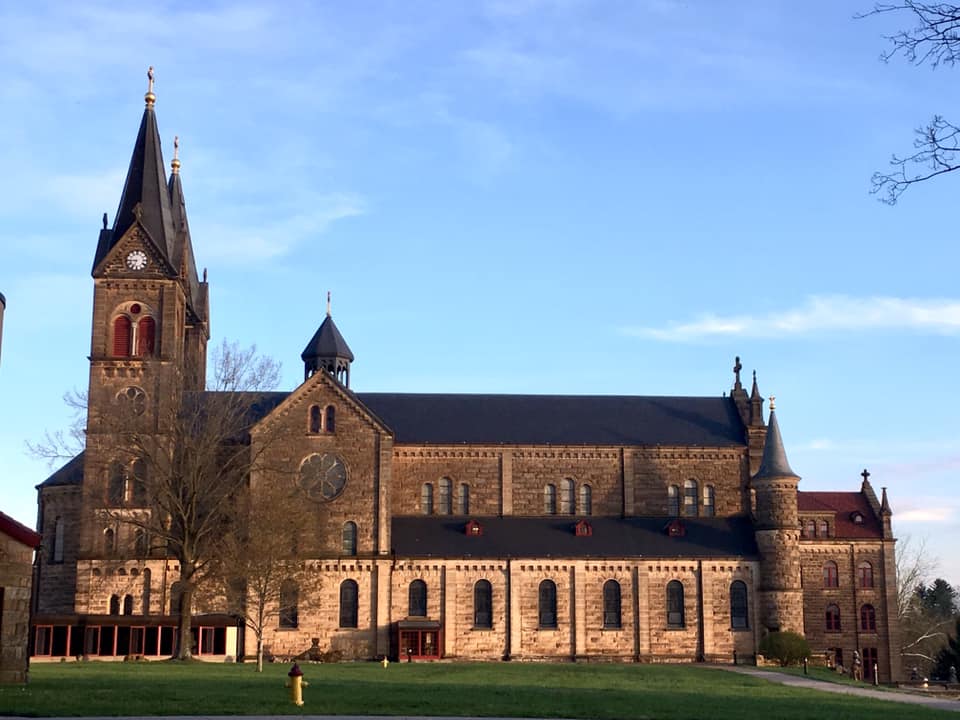
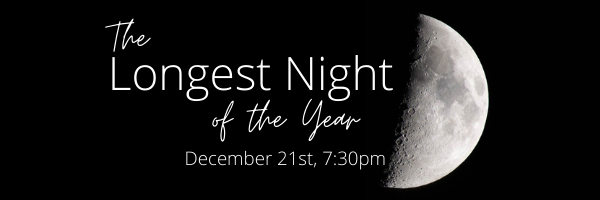
 RSS Feed
RSS Feed

